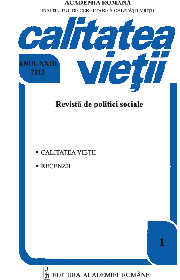Sănătatea percepută, calitatea serviciilor publice de sănătate şi satisfacţia faţă de viaţă
Self-rated health, public health services quality, and life satisfaction
Author(s): Marian-Octavian VasileSubject(s): Social Sciences
Published by: Editura Academiei Române
Keywords: Life satisfaction; self-rated health; quality of public health services; multilevel regression
Summary/Abstract: In this paper, using a multilevel approach, I want to test if selfrated health still has an influence for life satisfaction after controlling for the quality of public health services. Self-rated health global indicator measures not only the state of own health but also is the result of comparison with some reference. A person can answer to this global indicator given own state of health at a specific moment or given the evolution of own health in a relevant time frame. Also, the subjective health can be the result of comparison with some representation about best health; individuals can use references from peer group or even media. One can consider oneself as healthy if he or she perceives as having a good state than someone relevant to him or her. The inverse situation is also possible. Also, I expect to see a cross level interaction between self-rated health and quality of public health services. Health has also a strong social component. Besides the comparison process, there is an important role of the health system for maintaining a good health and increase the number of people who adopt healthy lifestyles. I believe that an efficient health system diminishes health inequalities: someone who can access a better health system, even if one rates own health as being bad, has a higher life satisfaction than those that can’t access qualitative services. The data comes from European Quality of Life Survey 2011–2012 and it is analyzed using multilevel regression. The statistical analysis offers support for the hypothesis and opens interesting roads toward other research projects. Health can influence in different ways individual’s quality of life. Each one of us can make an individual effort to maintain our own health but the positive effects of these efforts can be amplified by an efficient public health system. From policy perspective, we can see that those that evaluate their health as poor and the public health services that can be access have the lowest level of quality of life. There are several solutions. In this paper I controlled only for the difficulty of access in terms of cost and time. Future analysis should also include the quality of medical knowledge, the quality of interactions between clients and specialized personnel, the degree of access to medication etc. We also see that there are some differences between urban and rural areas that can reflect different ways of living given the specificities of these two social spaces. The costs are o common problem. A comparative analysis of different ways of conceptualizing and organizing health services from Europe can show the strengths and the weaknesses of these approaches, and then incorporate them in a functional system.
Journal: Calitatea vieţii
- Issue Year: XXIV/2013
- Issue No: 4
- Page Range: 404-422
- Page Count: 19
- Language: Romanian

